A Dutch couple who chased their dream to the hill country northeast of Rocky Mountain House has reached an emotional peak after years of struggling through deep and treacherous valleys.
In mid-June, during the awards program for the 2016 Alberta Pork Congress, Olymel procurement manager Don Brookbank presented his company’s High Health Award to Arnold and Alida Van Ginkel, operators of the A&A Van Ginkel Pork Farm since 2003.
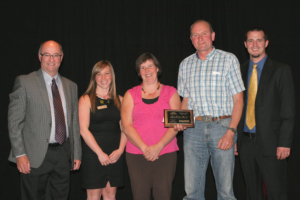 The award was part of Olymel’s annual Reach for the Top program, geared to encourage and recognize the best efforts of the 200 producers who regularly deliver their hogs to the Red Deer plant. The Van Ginkels were presented with a wall plaque and a cheque for $500 – which Arnold later said would nicely cover the cost of some circo-virus vaccine.
The award was part of Olymel’s annual Reach for the Top program, geared to encourage and recognize the best efforts of the 200 producers who regularly deliver their hogs to the Red Deer plant. The Van Ginkels were presented with a wall plaque and a cheque for $500 – which Arnold later said would nicely cover the cost of some circo-virus vaccine.
Being awarded for their health status was an especially a sweet moment for him and Alida, who forged through disaster after the spring of 2009, when some of the pigs in their barn caught H1N1 virus from a visiting contractor.
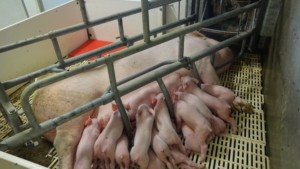 Investigators eventually determined that the contractor, hired to do some construction inside the barn, had picked up the virus during a vacation in Mexico. It couldn’t have happened at a worse time. The World Health Organization had been ringing alarm bells about a new pandemic, which it was calling the Swine Flu.
Investigators eventually determined that the contractor, hired to do some construction inside the barn, had picked up the virus during a vacation in Mexico. It couldn’t have happened at a worse time. The World Health Organization had been ringing alarm bells about a new pandemic, which it was calling the Swine Flu.
For weeks after the infection was first discovered, Arnold and Alida hosted a steady stream of government inspectors and other officials in their barn and at the massive table in the kitchen of their modest farm house. News reporters – local, regional and national – gathered near the farm gate when the discovery was first made public and some were eventually invited inside to talk about the infection and its impact on the farm.
As a precaution, the Van Ginkels were ordered to de-populate their entire herd, including 240 sows plus weaners, growers and finishers. Although compensated for the animals they lost, the Van Ginkels had to start over from scratch at a time when the entire industry was in a severe downturn that seemed to get worse with the passage of time. They started to rebuild their herd as soon as they could, shipping the first batch of hogs about a year after the infection shut them down.
“Quitting was never an option,” Arnold said after the awards banquet at Pork Congress. The virus that entered his and Alida’s farm had hit at a time when producers across Canada were embroiled in a financial crisis that would purge the industry of hundreds of producers. Calgary-based producer Jim Haggins (now retired), who took over from Herman Simons as chairman of Alberta Pork in 2010, said at the time that Alberta’s pork industry was in the midst of the worst crisis in 40 years.
Swine producers had felt the sting of low prices, high feed costs, labour shortages and non-tariff trade barriers including an unusually strong Canadian dollar and a trade battle with the United States.
While Haggins felt there may be a light at the end of the tunnel, conditions continued to worsen in the ensuing years, driving more producers out of the industry. Some were paid by the Canadian government to shut down their sow barns and keep them shut for at least three years.
Faced with production costs that exceeded their incomes for month after painful month, many hog producers farmed their equity, borrowing money so they could keep the heat on and keep the feed coming in while they waited for the industry to turn around.
They learned to do more with less. By the time hog prices had started to improve, the number of producers remaining in Alberta had dwindled by 30 per cent, to the roughly 380 who are still raising pigs today.
Much like the hogs they produce, the farms are bigger and they run leaner.
Back on their farm, the Van Ginkels are now preparing to expand their barn, both to accommodate the larger market weights being demanded at the plant and to make room for the switch they will eventually make to a loose housing system for their sows.
Arnold smiles, but says little about how he and Alida managed to raise seven children and keep their farm afloat through crisis upon crisis. He says only that he and Alida have stuck tightly to the recommended protocols in their efforts to raise clean, healthy pigs. These days, the herd has grown a bit to 350 sows, producing two to three shipments per week to Olymel in Red Deer.
And then, he and Alida both laugh out loud; “It’s because we’re stubborn. We’re Dutch.”
Brookbank said later that presenting the Van Ginkels with the High Health Award was an especially sweet moment for him. “In my data, when their name popped to the top, I was really excited,” said Brookbank.
“This is a really good story of a guy who persevered and kept going, now he’s rewarded. I thought it was awesome.” The awards were set up to recognize good work, focusing on the factors producers can control as managers.
“It’s all around what the owner of that farm or that producer has control of and does very well,” said Brookbank, who has been presenting the Reach for the Top Awards for 13 years.
“We believe that recognizing people will help both Olymel and the producers. I’m pretty proud of standing up there and recognizing those guys. It makes me feel really, really good, and when a producer is excited to win one of our awards, it’s awesome.”
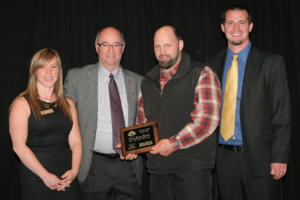 Reach for the Top awards producers in three additional categories, those being the Food Safety Award, the Core Lean Award and the Core Weight Award, based on a point system set up through the database at the plant.
Reach for the Top awards producers in three additional categories, those being the Food Safety Award, the Core Lean Award and the Core Weight Award, based on a point system set up through the database at the plant.
Producers can watch their progress through the year and see how they compare with the others who are delivering to the plant.
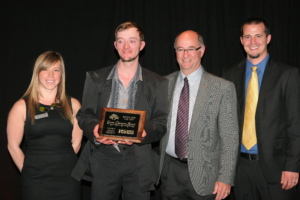 Alongside those four awards, Olymel also offers a Grand Champion, which may not necessarily include a farm that was named in one of those four areas. The Grand Champion will go to the farm that has earned the highest points overall, said Brookbank.
Alongside those four awards, Olymel also offers a Grand Champion, which may not necessarily include a farm that was named in one of those four areas. The Grand Champion will go to the farm that has earned the highest points overall, said Brookbank.
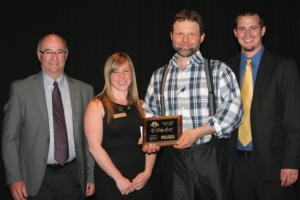 The 2016 winners, announced and presented at the Wednesday-night banquet, were A&A Van Ginkel Pork for High Health, Viking Colony for Food Safety, Lougheed Colony South for Core Lean and Fairville Colony for Core Weight. Each of those winners received a $500 and a plaque. Grand Champion went to Mialta Colony, including a plaque and a cheque for $1,000. •
The 2016 winners, announced and presented at the Wednesday-night banquet, were A&A Van Ginkel Pork for High Health, Viking Colony for Food Safety, Lougheed Colony South for Core Lean and Fairville Colony for Core Weight. Each of those winners received a $500 and a plaque. Grand Champion went to Mialta Colony, including a plaque and a cheque for $1,000. •
— By Brenda Kossowan





